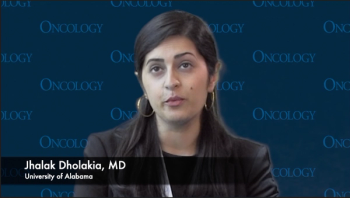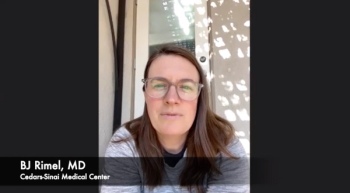
At SGO 2022, CancerNetwork® spoke with Jyoti Mayadev, MD, about a clinical trial involving immune priming with the PD-L1 inhibitor atezolizumab for patients with locally advanced cervical cancer.

Your AI-Trained Oncology Knowledge Connection!


At SGO 2022, CancerNetwork® spoke with Jyoti Mayadev, MD, about a clinical trial involving immune priming with the PD-L1 inhibitor atezolizumab for patients with locally advanced cervical cancer.

A survival benefit was observed in patients with advanced or recurrent endometrial cancer who were treated with maintenance selinexor.

The phase 3 PRIME study showed increased progression-free survival for patients with newly diagnosed ovarian cancer who were treated with an individualized starting dose of maintenance niraparib vs placebo.

The iPocc trial indicated that patients with ovarian cancer experienced an improvement in progression-free survival when treated with intraperitoneal carboplatin plus paclitaxel compared with intravenous chemotherapy, but this benefit did not translate to overall survival.

Phase 3 SOROYA trial revealed promising response rates with mirvetuximab soravtansine in patients with platinum-resistant ovarian cancer and high folate receptor–alpha expression.

Data presented at 2022 SGO from the phase 2 OVARIO trial show promise of niraparib plus bevacizumab in high-risk ovarian cancer treated with frontline platinum-based chemotherapy.

Patients with pretreated ovarian cancer who are resistant to platinum-based chemotherapy may experience promising responses and disease control following treatment with nemvaleukin alfa and pembrolizumab.

Results of the phase 1 NRG-GY017 trial show promise of atezolizumab as an immune primer in locally advanced cervical cancer.

Patients with BRCA-mutant, homologous repair deficiency–positive advanced resectable ovarian cancer may benefit from treatment with neoadjuvant niraparib, according to early results of a phase 2 trial reported at 2022 SGO.

Jhalak Dholakia, MD, discusses the promising neoadjuvant combination of of carboplatin and mirvetuximab soravtansine in folate receptor α–positive advanced-stage ovarian, fallopian tube, or primary peritoneal cancer.

Olaparib and non-platinum chemotherapy produced similar overall survival results when treating patients with platinum-sensitive, relapsed ovarian cancer with BRCA mutations.

No differences in overall and progression-free survival were observed at the GOG-0252 trial update among patients with ovarian cancer who were treated with intravenous or intraperitoneal chemotherapy plus bevacizumab.

Updated results from the KEYNOTE-826 study show a favorable risk-benefit ratio for pembrolizumab plus chemotherapy for patients with persistent, recurrent, or metastatic cervical cancer.

Olaparib maintenance therapy will be investigated after receiving first-line chemotherapy for patients with BRCA1/2 wild-type advanced ovarian cancer.

An anti-TIGIT/anti–PD-1 combination approach with ociperlimab plus tislelizumab will be examined in a phase 2 study of patients with previously treated recurrent or metastatic cervical cancer.

An overview of the phase 3 ARTISTRY-7 trial involving combination therapy with nemvaleukin alfa and pembrolizumab was presented at 2022 SGO.

The ongoing KEYNOTE-B21 trial aims to determine if pembrolizumab plus adjuvant chemotherapy with or without radiotherapy will improve disease-free survival and overall survival in patients with newly diagnosed endometrial cancer.

Long-term progression-free survival was associated with various clinical and molecular factors in patients receiving olaparib who had platinum-sensitive relapsed ovarian cancer and no germline mutations in BRCA1/2.

To assess the oregovomab combination, a phase 3 trial has launched for patients with advanced epithelial ovarian cancer.

The phase 2 CC-ANNIE trial was launched in China investigating anlotinib plus sintilimiab for recurrent platinum-resistant ovarian clear cell carcinoma.

Catherine Watson, MD, discussed the main results and key takeaway from a trial analyzing streamlined and traditional education practices for patients with ovarian cancer.

Patients with recurrent ovarian cancer experienced a longer overall survival and time to next treatment when receiving second-line PARP maintenance compared with active surveillance.


CancerNetwork® spoke with Ronnie Shapira-Frommer, MD, during the Society of Gynecological Oncology 2021 Virtual Annual Meeting on Women’s Cancer about her thoughts on the effect of the conference content across multidisciplinary specialties.

CancerNetwork® spoke with Ronnie Shapira-Frommer, MD, during the Society of Gynecological Oncology 2021 Virtual Annual Meeting on Women’s Cancer about patients with vulvar cancer who were treated with pembrolizumab monotherapy.

CancerNetwork® spoke with Ronnie Shapira-Frommer, MD, during the Society of Gynecological Oncology 2021 Virtual Annual Meeting on Women’s Cancer about patients with vulvar cancer who were responders to pembrolizumab monotherapy.

CancerNetwork® spoke with Ronnie Shapira-Frommer, MD, during the Society of Gynecological Oncology 2021 Virtual Annual Meeting on Women’s Cancer about a cohort of patients with vulvar cancer treated with pembrolizumab monotherapy.

CancerNetwork® spoke with Ronnie Shapira-Frommer, MD, during the Society of Gynecological Oncology 2021 Virtual Annual Meeting on Women’s Cancer about data focusing on a cohort of patients with vulvar cancer treated with pembrolizumab monotherapy.

An analysis from a phase 3 clinical trial shows the feasibility of CA-125 surveillance alone as a method for tracking disease progression in patients with advanced ovarian cancer receiving frontline maintenance with olaparib and bevacizumab.

Rimel, of the Cedars-Sinai Medical Center, focused her attention on the main takeaways to come out from the 2021 Society of Gynecologic Oncology Annual Meeting on Women’s Cancer.